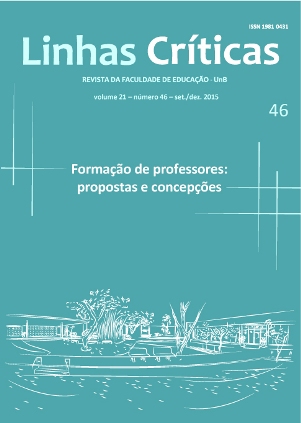The Researcher/reflective Teacher’s Perspective and the “Baron of Munchhausen” Character
DOI:
https://doi.org/10.26512/lc.v21i46.4641Keywords:
Teacher education;, Reflective/researcher teacher;, Research;, TeachingAbstract
This article presents a literature review guided by historical and dialectical materialism, in which are listed categories for analysis that structure the theoretical production of the reflective/researcher teacher; in this case, the relationship between theory and practice, autonomy, empowerment, and action research. Based on this analysis, we present five assumptions that we believe are components of the discussion about research by basic education teachers. We conclude by reaffirming the understanding of education as a battlefield for hegemony. Therefore, research for teacher education and work may represent a process of accountability or an emancipatory possibility, based on the epistemological and collective condition of the act of researching.
Downloads
References
ANDRÉ M. (org.) O Papel da pesquisa na formação e na prática dos professores. 4 ed. Campinas: Papirus, 2005.
ANFOPE. Documentos Finais dos V, VI, VII, VIII, IX, X, XI, XII, XII, XIV Encontros Nacionais da Associação Nacional pela Formação dos Profissionais da Educação. Brasília, de 1990 a 2014.
ARCE, Alessandra. Compre o Kit neoliberal para a educação Infantil e ganhe grátis dez passos para se tornar um professor reflexivo. Educação e Sociedade. v. 22, n. 74, abr. 2001.
CARR, Wilfrd e KEMMIS, Stephen. Teoria crítica de la enseñanza: la investigacion-acciónen la formaión del professorado. Barcelona: Martinez Roca, 2001.
CASTRO, Cláudio e CARNOY, Martin. Como anda a reforma da educação na América Latina. Rio de Janeiro. Fundação Getúlio Vargas, 1997.
CODO, Wanderley. Educação ”“ Carinho e Trabalho. 3 ed. São Paulo: Vozes, 2002.
DEWEY, John. Como pensamos ”“ como se relaciona o pensamento reflexivo com o processo educativo: uma reexposição. 3 ed. São Paulo: Companhia Editorial Nacional, 1933.
DUARTE, Newton. Vigotski e o “aprender a aprender”: crítica à s apropriações neoliberais e pós-modernas da teoria vigotskiana. 3 ed. Campinas, SP: Autores Associados, 2004.
ELLIOT, J. Recolando a pesquisa-ação em seu lugar próprio e original. In: GERALDI, Corinta M.G., FIORENTINI, Dario e PEREIRA, Elisabete M de A (orgs). Cartografias do trabalho docente: professor(a) pesquisador(a). Campinas: Mercado das Letras-ALB, 1998.
FREITAS, Luís Carlos de. Neotecnicismo e formação do educador. In: ALVES, Nilda (org.). Formação de professores, pensar e fazer. São Paulo: Cortez, 1998.
FREITAS, Luís Carlos de. Uma pós-modernidade de Libertação: reconstruindo as esperanças. Campinas, SP: Autores Associados. 2005.
FRIGOTTO, Gaudêncio. A produtividade da escola improdutiva. São Paulo: Cortez, 1984.
FRIGOTTO, Gaudêncio. Educação e crise do capitalismo real. 2. ed. São Paulo:Cortez, 1996.
GERALDI, Corinta Maria Grisola, FIORENTINI Dario; PEREIRA, Elisabete M. Aguiar (orgs.). Cartografias do trabalho docente: professor(a)-pesquisador(a). Campinas-SP: ALB, 1998.
GIROUX. Henry. Os professores como intelectuais: rumo a uma pedagogia crítica. Porto Alegre: Artes Médicas, 1997.
GRAMSCI A. Os intelectuais e a organização da cultura. Rio de Janeiro: Civilização Brasileira, 1978.
GRAMSCI, Antônio. Cadernos do Cárcere. v. 1. Edição e tradução: Carlos Nelson Coutinnho. Rio de Janeiro: Civilização Brasileira, 1999.
KOSIK, Karel. Dialética do concreto. São Paulo: Paz e Terra, 1976.
LEWIN, Kurt. Psycologie dynamique. Les relations humanies. Paris: PUF, 1946.
LÖWY, Michael. As aventuras de Karl marx contra o Barão de Münchhausen: marxismo e positivismo na sociologia do conhecimento. 12 ed. São Paulo: Cortez, 1998.
MANACORDA, M. A. Marx e a pedagogia moderna. Tradução de Newton Ramos-de-Oliveira; revisão técnica de Paolo Nosella; prefácio de Demerval Saviani. 3. ed. São Paulo: Cortez, Autores Associados, 2000.
MARX, Karl e ENGELS, Friedrich. A ideologia alemã: teses sobre Feurbach. São Paulo: Moraes, 1984.
NÓVOA. António. (org.). Os professores e sua formação. 3 ed. Lisboa: Dom Quixote, 1997.
OLIVEIRA, Betty Antunes de. O trabalho educativo: reflexões sobre paradigmas eproblemas do pensamento pedagógico brasileiro. Campinas-SP: Autores Associados,1996.
PERRENOUD, P. et all ( org) Formando professores profissionais. Quais Estratégias? Quais Competências?. Porto Alegre: Artmed Editora, 2001.
RENAUT, A. O Indivíduo: reflexões acerca da filosofia do sujeito. Rio de Janeiro: Difel, 1998.
SACRISTÁN, J. Gimeno e GÓMEZ, A. L. Pérez. Compreender e transformar o ensino. 4 ed. Porto Alegre: Artmed, 1998.
SHON, Donald. Educando o profissional reflexivo. Porto Alegre: Artes Médicas, 2000.
STENHOUSE, L. la investigación como base de la enseñaza. 2ed. Madri: Morata, 1987.
STENHOUSE, L. Investigación y desarrollo del curriculum. 4 ed. Madrid: Morata, 2003.
VYGOTSKY, L. S. Pensamento e linguagem. 3. ed. São Paulo: Martins Fontes, 1991.
ZARAGOZA, Jose Manuel Esteve. O mal-estar docente: a sala de aula e a saúde dos Professores. São Paulo: Edusc, 1999.
ZEICHNER, Kenneth M. A formação reflexiva de professores: idéias e práticas. Lisboa: Educa, 1993.
Downloads
Published
How to Cite
Issue
Section
License
Copyright (c) 2016 Linhas Críticas

This work is licensed under a Creative Commons Attribution 4.0 International License.
Authors who publish in this journal agree to the following terms:
-Authors maintains the copyright and grants the journal the right of first publication, the work being simultaneously licensed under the Creative Commons Attribution License which allows the sharing of the work with recognition of the authorship of the work and initial publication in this journal.
- Authors are authorized to enter into additional contracts separately, for non-exclusive distribution of the version of the work published in this journal (eg publish in institutional repository or as a book chapter), with acknowledgment of authorship and initial publication in this journal.
-Authorers are allowed and encouraged to publish and distribute their work online (eg in institutional repositories or on their personal page) at any point before or during the editorial process, as this can generate productive changes as well as increase the impact and the citation of published work (See The Effect of Free Access).



